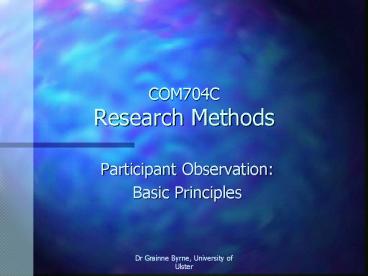COM704C Research Methods - PowerPoint PPT Presentation
1 / 19
Title:
COM704C Research Methods
Description:
Observation is a research method in which the investigator systematically ... Ethnography derives from anthropology and adheres to philosophy of phenomenology ... – PowerPoint PPT presentation
Number of Views:51
Avg rating:3.0/5.0
Title: COM704C Research Methods
1
COM704CResearch Methods
- Participant Observation
- Basic Principles
2
Observation Methods
- Observation is a research method in which the
investigator systematically watches, listens to
and records the phenomenon/phenomena of interest
3
Observation in Enquiry Purposes
- Can be used for a variety of purposes
- in an exploratory phase
- as a supportive or supplementary technique to
data obtained through other means - in experimental research
- in survey research (quite rare)
4
Observations Benefits
- Involves actual, not self-reported, behaviour
- Does not rely on memory or willingness to reply
- Real-time research - at time of occurrence
- Can include factors people take for granted
5
Observations Limitations/1
- Cannot infer what caused behaviour
- Can be time-consuming and expensive
- Threats to reliability and validity
- Observer bias
- Reactive effects of observers presence
- Impossible to observe large samples of units of
study (people/organisations)
6
Limitations/2
- Argued that participant observation is
- subjective
- biased
- impressionistic
- lacks any quantifiable measures (eg, as opposed
to surveys and experiments)
7
Ethnography - Definition
- As a process, ethnography involves prolonged
observation of the group, typically through
participant observation in which the researcher
is immersed in the day-to-day lives of the people
or through one-on-one interviews with members of
the group. The researcher studies the meanings
of behaviour, language, and interactions of the
culture-sharing group.
8
Ethnography
- Qualitative (participant) observations frequently
referred to as ethnography - Ethnography derives from anthropology and adheres
to philosophy of phenomenology - It involves a triangulated approach to research,
eg, using other approaches (interviews and
records) to validate the observations
9
Ethnography
- Main data collection techniques
- participant observation
- non-participation
- ethnographic interviewing
10
Participant Observation
- Observer does not just observe and record
behaviour (interpreting and explaining), but
joins in everyday activities of the subjects - It is undertaken and used
- for analysing patterns of interaction and
- as basis for analysing nature of social structures
11
Participant Observation
- Sets out to do two things
- allow researcher to see world of subjects in its
natural setting - allow researcher some insights into how subjects
view their world - allow researcher to gain an understanding of these
12
Participant Observer Roles
- Complete participant
- Participant as observer
- Observer as participant
- Complete observer
- Gold, 1969
13
Complete Participant
- Researcher attempts to engage fully in activities
of the group/organisation under investigation - Role is covert - intentions are not made explicit
(ethical issue) - Advantage - produces more accurate information
and an understanding not available by other means
14
Participant as Observer
- Overt role - intentions made clear
- Observations through participating, plus
- Observer can ask members to explain aspects of
what is going on - Trust of key members is important
- But, dual role of participant and observer may be
difficult to maintain
15
Observer as ParticipantComplete Observer
- Observer as Participant
- Status as researcher is known
- Often used in studies involving one-visit
interviews - Complete Observer
- Role as researcher is not made explicit
- Non-participant role
- Role completely removes researcher from observed
interactions (eg laboratory experiment)
16
Which Role? Determining Factors
- Purpose of research
- Time available for research
- Degree to which you feel suited to participant
observation - Organisational access
- Ethical considerations
17
Data Collection
- Descriptive observations
- Spradley (1980) identifies nine dimensions on
which descriptive data may be collected - Focused observations
- Selective observations
18
Spreadley - Descriptive Data
- Space
- Actors
- Activities
- Objects
- Acts
- Events
- Time
- Goals
- Feelings
19
Analysis of Observations
- Selection and definition of problems, concepts
and indices - Observed phenomena placed within a theoretical
framework for further investigation - Check frequency and distribution of phenomena
- Construction of social systems model
- Becker, 1979































